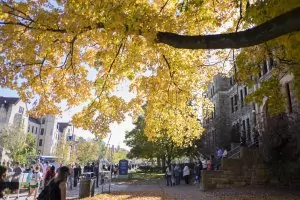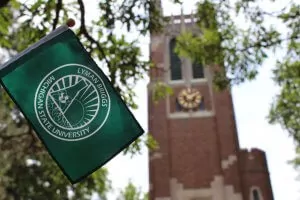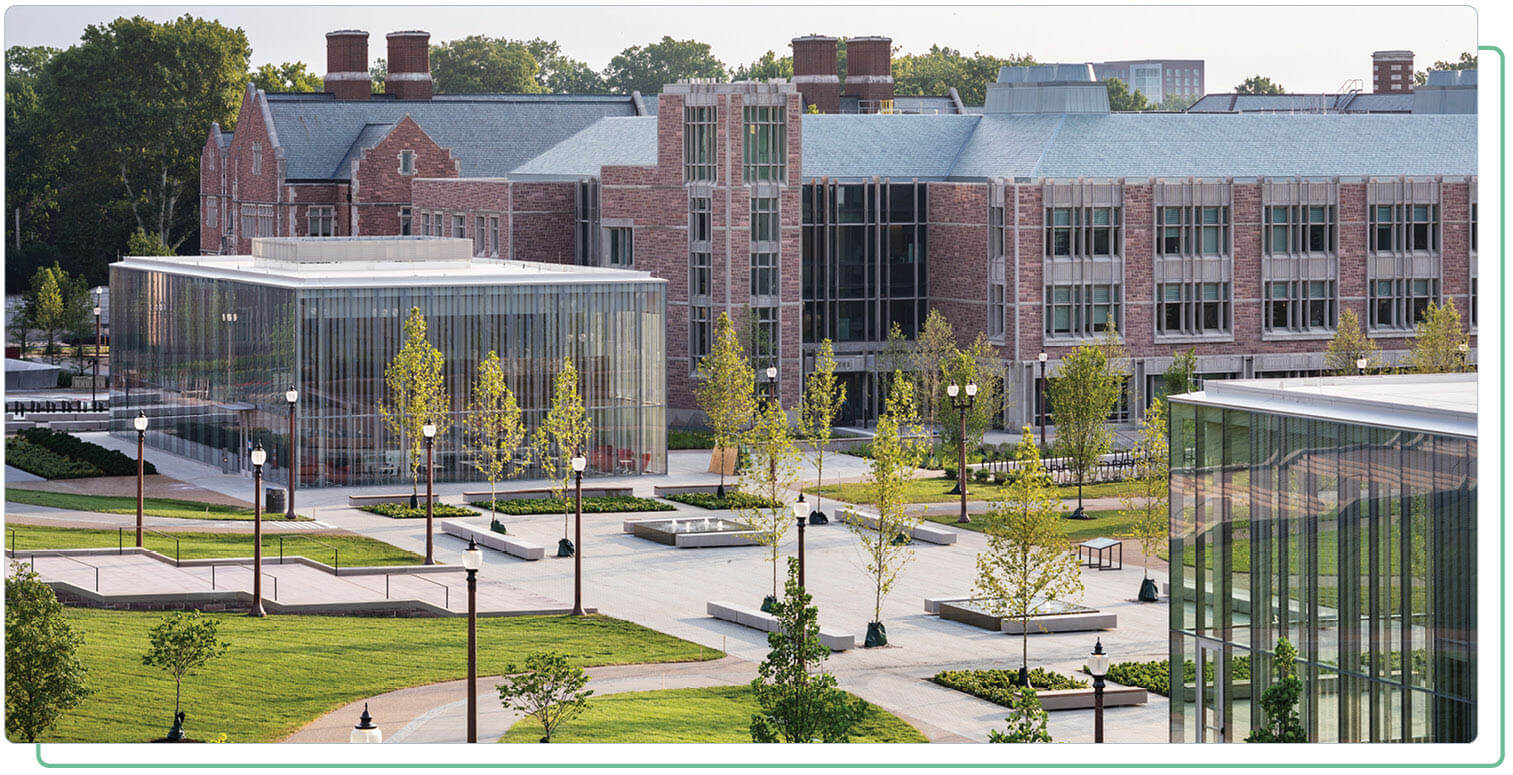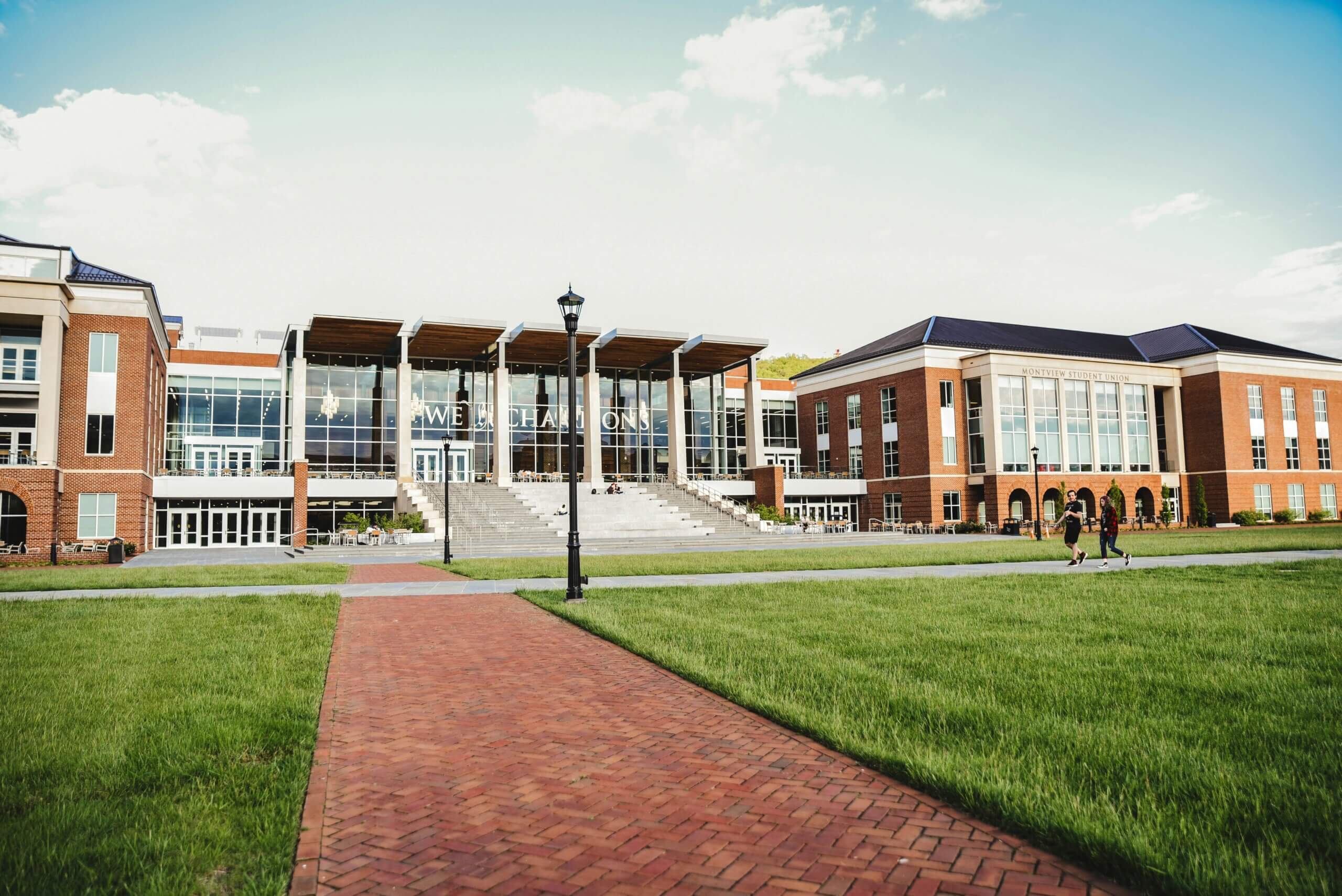Formal mentoring becomes foundational at Washington University in St. Louis
Founded in 1853, Washington University in St. Louis (commonly referred to as “WashU”) is a highly selective university that attracts students from more than 100 countries and all 50 states, and 90% of undergraduates hail from out of state. WashU students are encouraged to pursue multiple degrees of study; approximately 80% of undergraduates pursue multiple majors or minors.
The McKelvey School of Engineering’s undergraduate, graduate and professional degree programs account for about 15% of WashU’s total enrollment of 15,539 students. Undergraduate students can choose from 12 majors and 15 minors, ranging from Biomedical to Electrical to Mechanical Engineering, and Robotics to Human-Computer Interaction.
The search for a better mentoring alternative
In 2016, the McKelvey School of Engineering started the Women & Engineering Leadership Society, which pairs women students and alumnae for mentorship in addition to providing leadership, personal, and professional development opportunities. To support the mentorship aspect with alumnae based all over the U.S. and abroad, the school searched for a platform that could host a structured mentoring program online. In the process, the McKelvey School of Engineering quickly realized that this was a need for the entire school, and created formal mentorship programs pairing students and alumni for all undergraduate and full-time masters students.
“We were with another vendor for three years, and we had a good run, but we wanted to explore other options,” said Emily Boyd, Teaching Professor and Director of Undergraduate Studies, Department of Mechanical Engineering & Materials Science. “PeopleGrove really stood out to us as a better solution, and the cost happened to be lower.”
Emily and the McKelvey Engineering team also wanted to give their community more expansive opportunities to connect with each other. Students and alumni needed the ability to contact more people than just the one person they were formally matched with.
“We would often get student groups who would ask how to find an alum speaker from a particular industry,” Emily said. “For example, The National Society of Black Engineers would want a Black alumnus to speak [at an event], but in order to find the right candidate, they would have to go through our University Advancement office. We simply needed a way for our students and alumni to find each other.” With that objective in mind, the team turned to PeopleGrove.
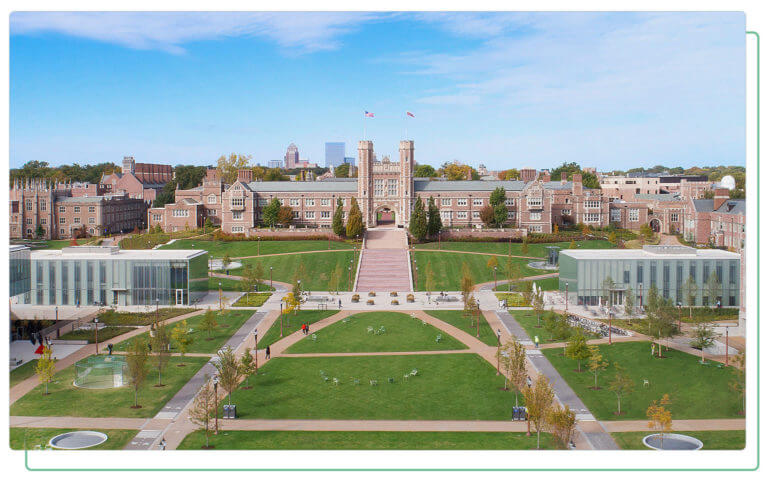
Teaming up with University Advancement
WashU’s Alumni Board of Governors, which serves as the advisory board to the university on behalf of the Alumni Association, had previously explored various options for mentoring platforms in years past. Once Emily decided to launch with PeopleGrove, she immediately saw an opportunity to join forces with University Advancement.
“I contacted them and said, ‘McKelvey Engineering is signing up with PeopleGrove. Do you want to join us and do it together?’ The concept of an online mentorship platform was in alignment with their strategic plan,” she recalled. “The timing was right.” Not only was the timing fortuitous, but Emily also believes universities are driven to keep up with what their peers in higher ed are offering their alumni—for example, the opportunity for alumni to mentor students. So, what started as a school-specific initiative quickly expanded.
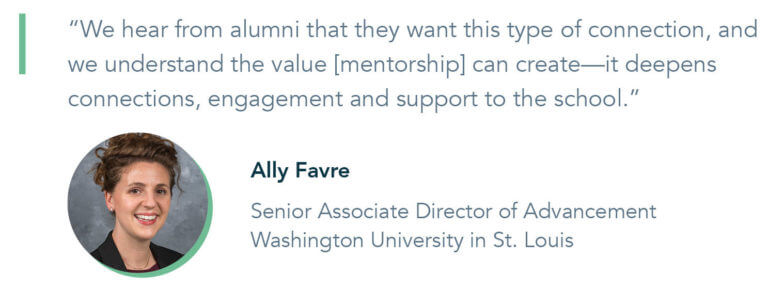
Ally Favre, Senior Associate Director of Advancement at Washington University in St. Louis, works within University Advancement to secure financial support for the McKelvey School of Engineering, as well as strengthen alumni involvement. “We hear from alumni that they want this type of connection,” Ally said. “And we understand the value [mentorship] can create—it deepens connections, engagement and support to the school.”
Emily’s team also collaborates closely with Kathy Budde, Associate Director of Class and University Programs at Washington University Alumni Association. Kathy oversees the sitewide platform, and manages registrations for the university community as a whole.
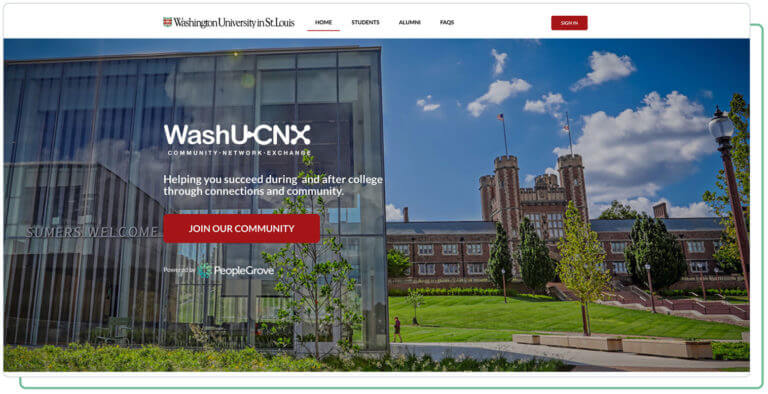
Mentorship programs: Informal and formal
Melanie Osborn, Senior Assistant Dean at McKelvey School of Engineering, shares Emily’s passion for student mentorship programs. “Mentorships are very important for our students,” she stated. “Having a window into engineering as a career—or a springboard for a career in another area—is something that is not as natural as being a teacher or a doctor. Also, engineering is a challenging discipline for study. Having the ability to view the job with someone ‘in the field’ can be insightful and helpful.”
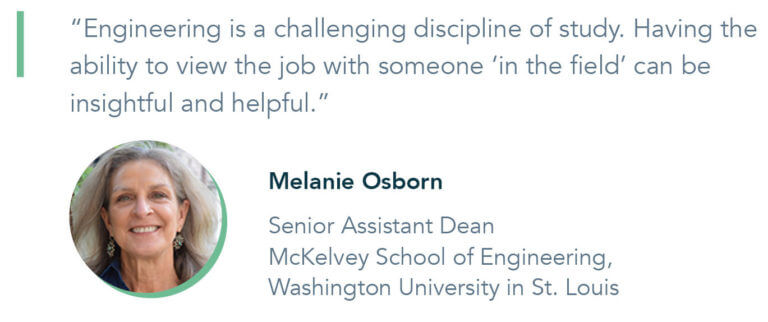
Informal/”Flash” Mentoring
When WashU made the switch to PeopleGrove, their strategy included expansion of their mentorship programs. Their team identified a need for adding informal mentorship (also known as “flash” mentorship) to their program offerings.
“It’s really important to have long-term mentorship relationships because having that consistent presence in your life helps you grow as a person,” Emily said. “But there’s also the need for flash mentorship.” She cited the need for students to be able to broaden their network. “If you have an internship in a particular city and you’re trying to network, or maybe you want to find someone who is a WashU alum, who works at a particular company, you need a flash mentor versus a long-term mentor.”
“PeopleGrove’s Flash Mentoring fits the bill for students—make a connection, ask your questions, get a quick response and support,” added Melanie.
Formal Mentoring
Informal or “flash” mentoring brings tremendous benefits to WashU students and alumni, and McKelvey doubles down on its investment in mentorship with the inclusion of structured, formal programs.
When WashU started working with PeopleGrove, they brought three already-established mentorship programs with them, all designed for undergraduates. “We use these programs to support all of our students, but also with an eye towards underrepresented minorities and underserved students, too,” Emily said.
McKelvey Engineering’s “Women & Engineering” (W&E) is an engagement initiative designed to promote career development opportunities for female-identifying alumnae, students, faculty and staff. The school firmly believes in the impact that mentorship programs can have on a young person’s career trajectory—especially women in engineering and STEM. The United States Census Bureau estimates that only 15 percent of U.S. engineering jobs are held by women.
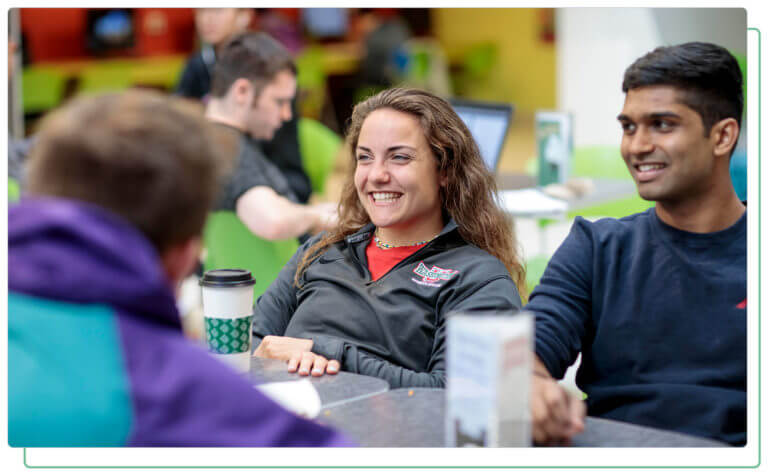
Students enrolled at the McKelvey School of Engineering. Photo courtesy of Washington University in St. Louis.
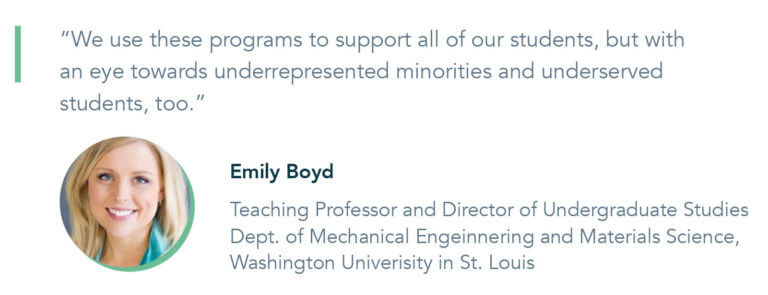
McKelvey Engineering Formal Mentoring Programs
McKelvey CNX (Stands for “Community Network Exchange” and pronounced as “connects”)
Available to all McKelvey Engineering students, from 1st-year to seniors/4-year students.
Women & Engineering CNX
Available to members of the W&E Leadership Society.
Dual Degree CNX
Available to transfer students earning a liberal arts degree who plan to earn an additional bachelor’s degree in engineering at WashU.
Services
WashU enlisted PeopleGrove’s managed services team for their formal mentoring programs, effectively augmenting their existing team with PeopleGrove program management experts to oversee day-to-day operations. McKelvey Engineering faculty and staff aren’t able to dedicate the time required to set up and run an ongoing mentorship program—let alone three. “One of the criteria for us [in selecting a vendor] is that we need a little bit of hand-holding,” said Emily. “Every person on our team already has a full-time job. If we didn’t have PeopleGrove, and especially [PeopleGrove’s Head of Mentoring Programs] Caitlin and the team, we would have to hire someone.”
However, Emily didn’t want to be completely hands-off, either. She still needed visibility and control over setup and implementation—aspects of program management that were lacking previously. “It was nice to be able to actually go into the platform, see the emails, test them myself, or change the text directly if I wanted to,” Emily recalled.
Accelerated time to value
PeopleGrove’s managed services team typically gets a formal mentoring program up and running in six weeks, from kickoff to match. With the timing of WashU’s program launch coinciding with the winter holiday season, the process took a bit longer than usual. Nevertheless, they began setup at the end of November, launched the platform to their users in January, and matched in early February.

Sophisticated Matching Algorithms
Because the McKelvey Engineering team had already managed the three formal mentoring programs for several years, they knew what their students were looking for in a mentor. “Our students really want to be matched with an alumnus who is in a similar field as the one they’re interested in pursuing,” Emily shared.
Participants were matched based on factors such as Major, Personal Interests, Engineering Field of Interest or Expertise, Ethnicity, Gender Identity, and more. (Naturally, any students in the Dual Degree program were matched with a dual degree alumnus.)
“That’s a big difference we’ve seen with PeopleGrove—the quality of the matches has been very good,” Emily said. Not only is the quality improved, but her team is also thrilled with the volume of connections resulting from those high-quality matches. “67% of users having a two-way connection is great — I’m very happy with this result. Before using PeopleGrove, we would see a bunch of people sign up but only half would actually participate.”
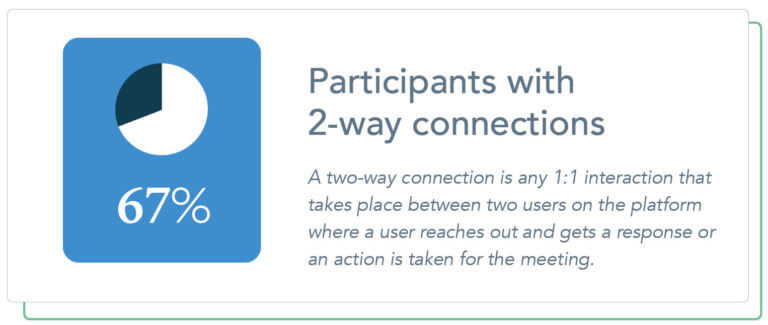
Comprehensive Training & Education
WashU took advantage of PeopleGrove’s pre-built training Pathways to prepare mentors and mentees. Participants went through a series of on-demand, self-guided, and interactive content to prepare for mentorship. Each person was able to read the material at their own pace, and then answered a series of questions for each training section, which included segments like Goal Setting, Mentoring Across Difference, Effective Communication, and Asking for Help.
PeopleGrove sets Goals for both mentees and mentors; they are tasks for every participant to complete to add structure to the mentor-mentee relationship. They’re highly customizable, and also serve as a useful engagement metric for pairings. PeopleGrove automatically sends email reminders to participants who haven’t completed their goals. WashU chose to set goals for milestones such as introductions and scheduling meetings.
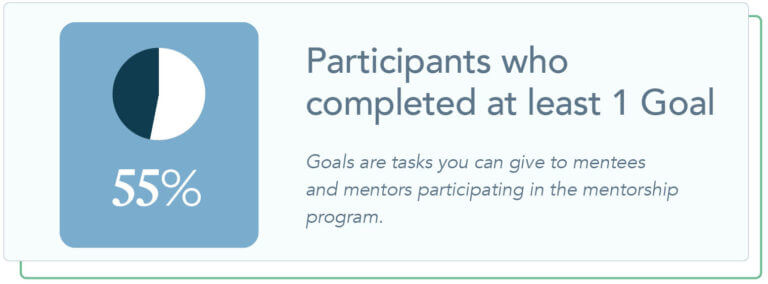
Mentor & Mentee Satisfaction
Participants reported meaningful connections with their mentor or mentee, with an average user rating of 4.74 out of 5 stars across the three formal programs.
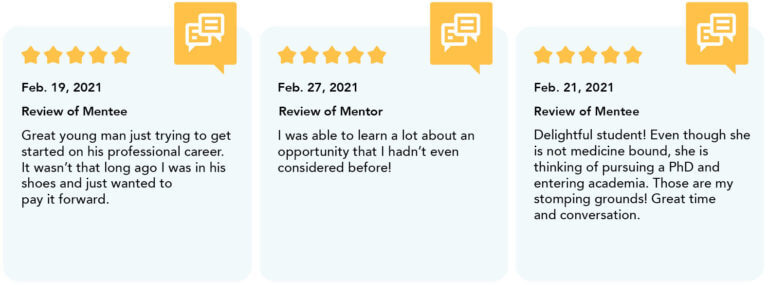
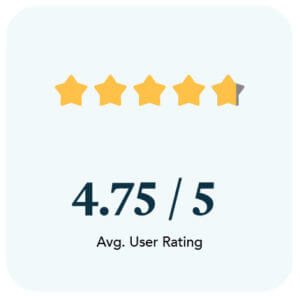
Results and Evolution
Having completed the 2020-2021 academic year and their initial mentorship cycle with PeopleGrove, the team reflected on their collective experience so far. “PeopleGrove offers more opportunities for discussions as a ‘go-to’ resource,” said Ally. “It’s an elevated opportunity for networking.” She and Emily both anticipate scalability for their programs, and continued sustainable practices in managing mentorship programs.
“When we purchased PeopleGrove, we anticipated that McKelvey would serve as an example, and other schools and other mentorship programs at WashU would follow suit,” Emily said. Sure enough, other colleges have started to express interest in using PeopleGrove. Ally added: “We’ve had good success with PeopleGrove and we’re sharing our experiences as ambassadors for this valuable tool.”
The team is looking ahead to the next academic year and will continue to partner with PeopleGrove. “We’ll definitely still utilize PeopleGrove’s team to run the long-term mentorship programs for us,” Emily said. “It’s been really useful for Caitlin to keep an eye on the programs…she’s obviously really experienced in this area, and she knows what to look for. There’s no way our team would be able to monitor what’s going on with participants and make sure all of their needs are being met.”
Emily believes the need for mentorship—both short- and long-term—isn’t going away anytime soon. “Especially in fields like engineering when you’re looking for internships and jobs, your connections are critical to your success,” she said. “Mentorship is one really important way you can expand those connections.”
PeopleGrove supports more than 400 mentoring programs with 215,000 participants. Learn more at peoplegrove.com/managed-formal-mentoring-programs.
